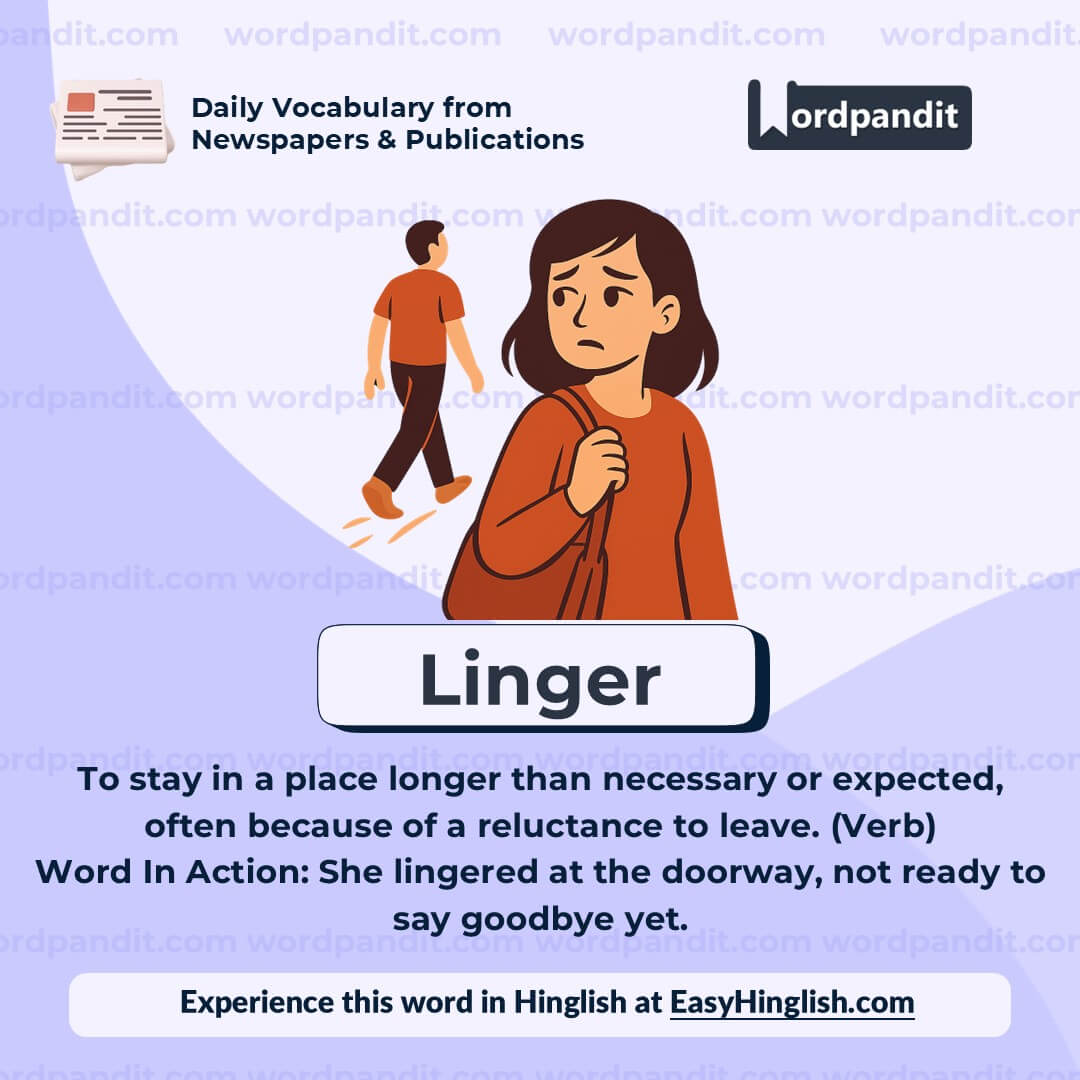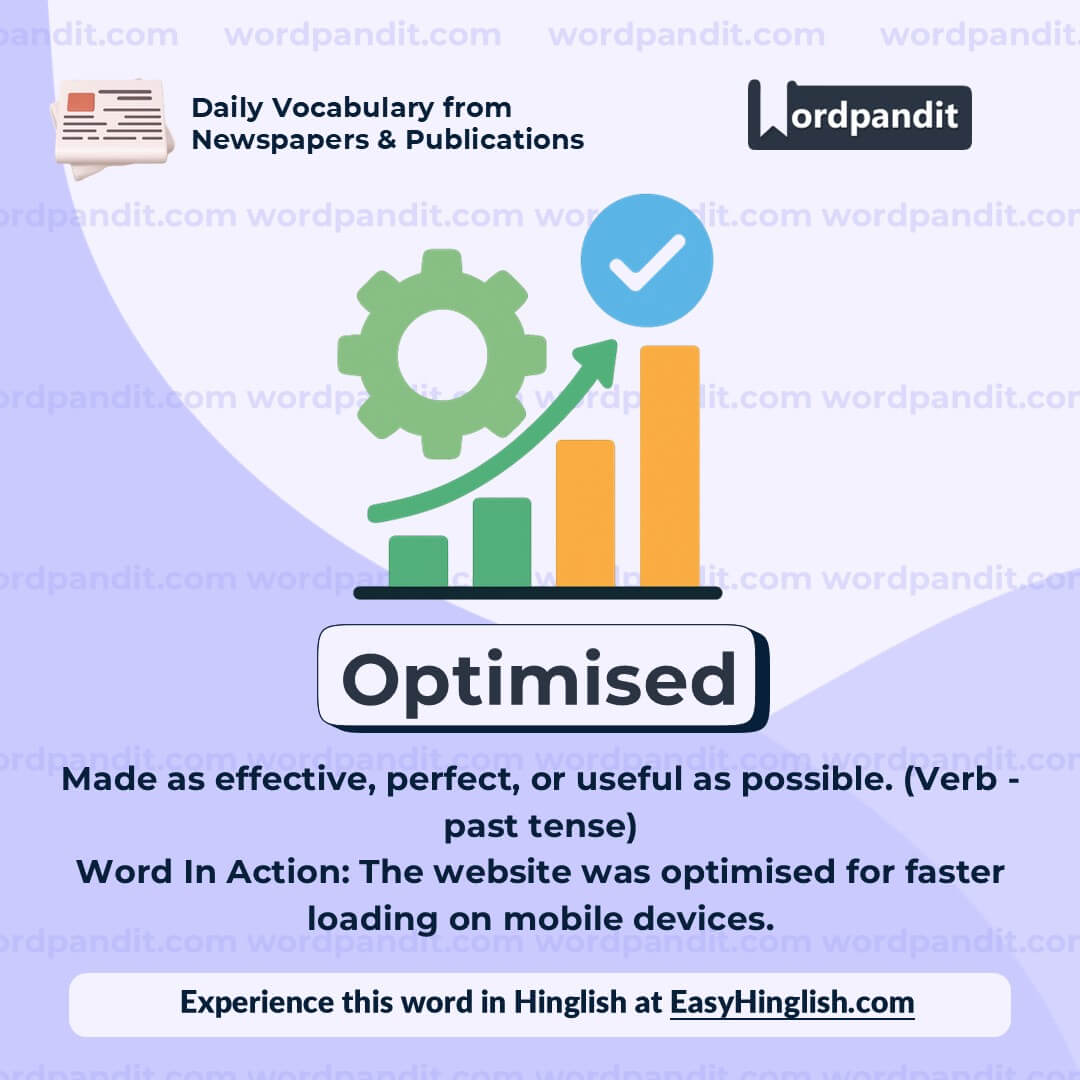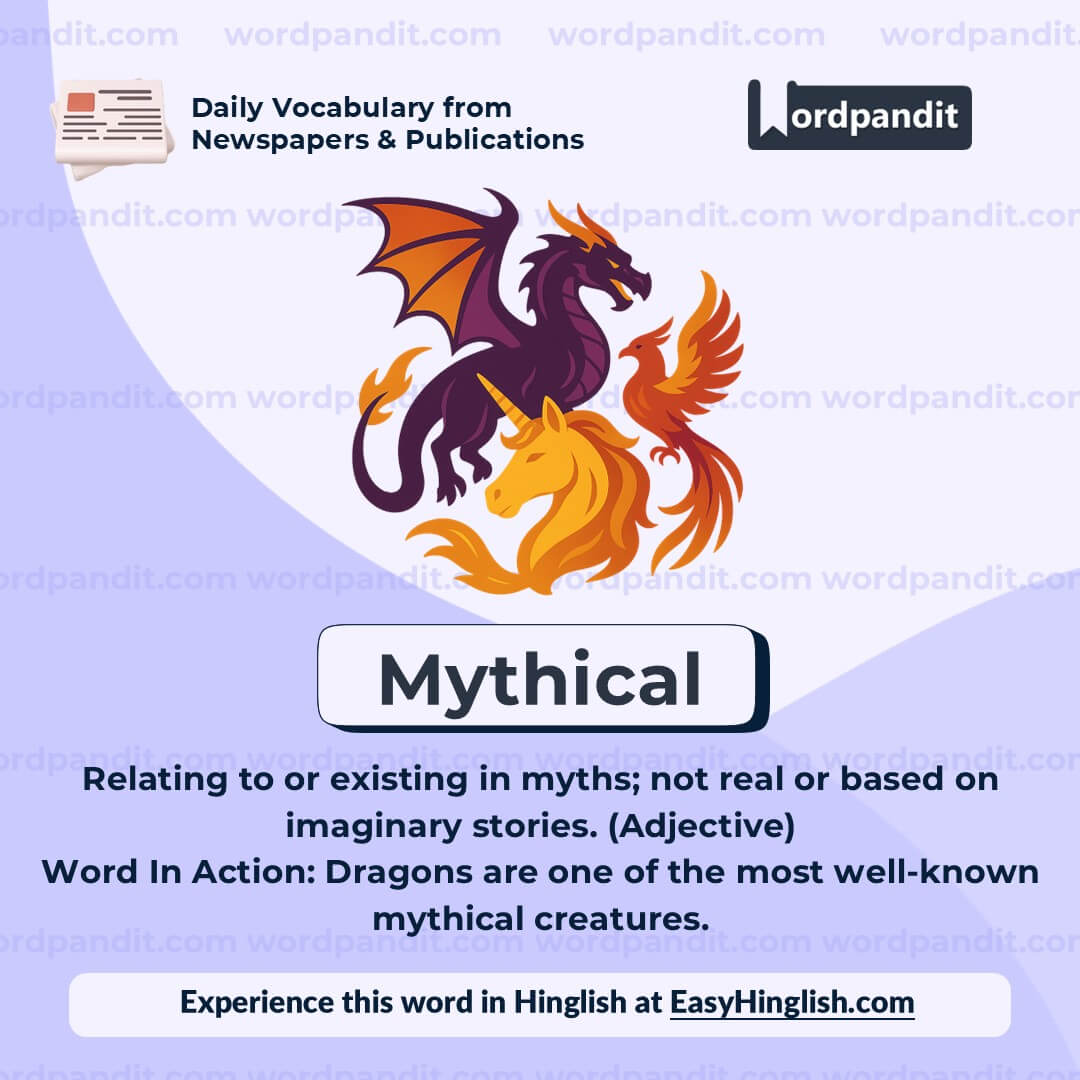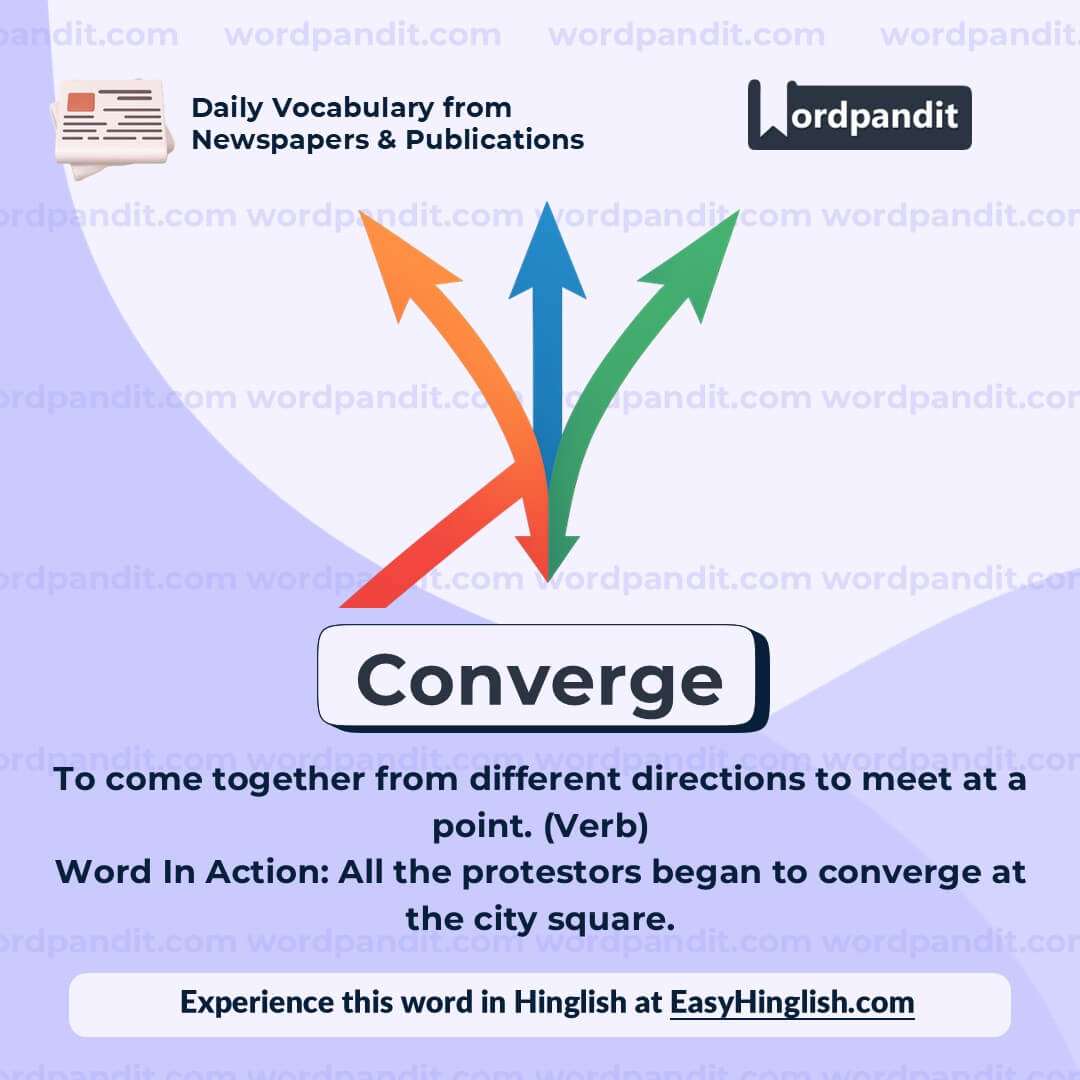Daily Vocabulary from International Newspapers and Publications
Expand Your Vocabulary with Wordpandit’s Global Vocabulary Hub
At Wordpandit, we are committed to helping you develop a truly global vocabulary by drawing from some of the most respected international publications. This section is designed to keep you ahead of the curve by introducing you to words that define global conversations and trends.
The Power of Global Sources
To help you think and communicate on a global scale, we curate vocabulary from renowned international sources, such as:
- The New York Times
- The Washington Post
- BBC
- The Guardian
- The Economist
- Scientific American
- Psychology Today
- And many more...
Stay Global, Stay Competitive
Our daily updates from international publications ensure you are consistently exposed to new words that reflect global news and developments, making sure your vocabulary is not only current but also globally relevant.
Enhance Your Global Perspective
Whether you’re preparing for international exams, aiming to excel in global business communication, or want to enhance your language skills for personal growth, Wordpandit offers the resources you need to thrive in a global context.
Effective Learning, Global Reach
Our learning methodology combines global examples, memory aids, and interactive activities, allowing you to internalize new words effectively and apply them in real-world scenarios.
Begin Your Global Vocabulary Journey Now!
Why Choose Wordpandit?
Practical Learning: Focus on words you'll actually encounter in real-world reading, enhancing your comprehension and communication skills.
Diverse Content: From current affairs to scientific breakthroughs, our varied sources expose you to vocabulary across multiple domains.
Effortless Integration: Make Wordpandit a part of your daily routine. Just a few minutes each day can significantly boost your lexicon over time.
Your Path to Vocabulary Mastery
- Visit our Daily Vocabulary section regularly
- Explore new words and their usage in context
- Practice incorporating these words into your own writing and speech
- Track your progress as your vocabulary expands
Start Your Journey Today
Embark on your vocabulary enhancement journey with Wordpandit. By consistently engaging with our daily posts, you'll build a robust vocabulary that serves you well in academic, professional, and personal contexts.
Remember, a word a day keeps linguistic limitations at bay. Make Wordpandit your daily companion in the quest for vocabulary excellence!
WORD-1: Linger
Context:
"The great thing about philosophy is that we can all do it. Anyone can ask philosophical questions about reality, truth, right and wrong, and the point of it all, and we often do, at least for brief moments throughout the day. The best books, TV shows, and movies all come dyed in philosophy, and they plant ideas that linger long after you close the book or the screen fades to black." - Big Think
Explanatory Paragraph:
To linger means to stay in a place or remain in the mind for longer than expected. It can describe a physical presence, such as someone not wanting to leave a room, or an emotional or mental experience, like a thought or feeling that continues to stay with you. In the context of the sentence, it refers to philosophical ideas or emotions that stay with us, even after the book or movie has ended.
Meaning: To remain or stay longer than usual or expected; to be slow in leaving or fading (Verb)
Pronunciation: LIN-gur
Difficulty Level: ⭐⭐ Beginner
Etymology: From Middle English "lengeren," from Old English "lengan" meaning to prolong or lengthen.
Prashant Sir's Notes:
Think of "linger" as the opposite of rushing away. When something lingers, it's because it carries emotional weight or unfinished business. It's a very visual word — imagine the smell of coffee lingering in the kitchen or a melody staying in your head.
Synonyms & Antonyms:
Synonyms: remain, stay, persist, dawdle, loiter
Antonyms: leave, vanish, hurry, depart, rush
Usage Examples:
- The scent of her perfume lingered in the hallway long after she had gone.
- He lingered at the door, unsure of whether to say goodbye or not.
- The pain of the loss lingered in his heart for years.
- Her words lingered in his mind, echoing with unexpected weight.
Cultural Reference:
"I lingered round them, under that benign sky: watched the moths fluttering among the heath and harebells..." — *Wuthering Heights* by Emily Brontë
Think About It:
What are some memories, ideas, or moments in your life that continue to linger? Why do you think they stay with you?
Quick Activity:
Write down two sentences using "linger" — one about a physical setting, and one about an emotion or thought.
Memory Tip:
Think of a "lingering hug" — one that lasts longer than usual. The word itself has a soft, drawn-out sound, much like the action it describes.
Real-World Application:
"Linger" is useful when expressing emotional or sensory experiences that stay with you — like smells, memories, feelings, or thoughts. It's often used in literature and film reviews to describe how something continues to affect the audience after it's over.
WORD-2: Optimised
Context:
"The optimised morning routine has become a near-mythical ideal for young people, sold by fitness influencers posting obsessively about their 5.30am starts, claiming to finish their weight training, macronutrient-rich meals and emails before our first alarm – promising that everything in your life would be better if you, too, had the discipline to just get up early." - The Guardian
Explanatory Paragraph:
“Optimised” means something has been improved or made as effective, efficient, or functional as possible. In this context, an "optimised morning routine" refers to a highly planned and perfected set of morning activities that aim to increase productivity, health, or mental well-being. The idea is that by tweaking every small habit for maximum benefit, you’ll get better results in life overall.
Meaning: Made as effective, efficient, or functional as possible (Verb - past participle of "optimize")
Pronunciation: OP-tuh-myzd
Difficulty Level: ⭐⭐ Beginner
Etymology: From Latin "optimus" meaning "best" → English "optimize" (to make the best or most effective use of something)
Prashant Sir's Notes:
Think of "optimised" as a version of something that’s been tuned or refined to its best performance — like a race car after a tune-up or a study schedule that helps you retain the most in the least time. It’s about getting the most out of what you have.
Synonyms & Antonyms:
Synonyms: enhanced, improved, refined, fine-tuned, upgraded
Antonyms: neglected, worsened, impaired, degraded, inefficient
Usage Examples:
- The website was optimised for faster loading on mobile devices.
- She optimised her study schedule to cover all subjects before exams.
- The company has optimised its production process to reduce waste.
- His training plan was optimised to improve endurance and strength simultaneously.
Cultural Reference:
“Life hacks” culture on platforms like YouTube and Instagram has led to a rise in videos about "optimised living" — everything from meal prepping and journaling to biohacking routines that aim to make your life more productive.
Think About It:
Is constantly trying to "optimise" every aspect of our lives helpful, or can it become overwhelming? Where should we draw the line?
Quick Activity:
Pick one routine in your day — like your morning or study time — and write down two ways you could optimise it to save time or improve results.
Memory Tip:
Think of "optimised" as "optimized to the max" — the word has “opt” (short for option/choice) and “-mise” (as in maximise). So, it's about choosing the best and maximizing its potential!
Real-World Application:
“Optimised” is commonly used in fields like technology, health, fitness, and business. Whether it’s optimising a website for search engines (SEO), a workout plan for muscle gain, or time management for productivity, this word captures the modern quest for efficiency and improvement.
WORD-3: Mythical
Context:
"The optimised morning routine has become a near-mythical ideal for young people, sold by fitness influencers posting obsessively about their 5.30am starts, claiming to finish their weight training, macronutrient-rich meals and emails before our first alarm – promising that everything in your life would be better if you, too, had the discipline to just get up early." - The Guardian
Explanatory Paragraph:
“Mythical” refers to something that is rooted in myths or legends, often imagined or exaggerated. It can describe ancient stories, creatures, or even modern-day ideals that are so perfect or extreme they seem unreal. In the given context, the phrase “near-mythical ideal” suggests that the so-called perfect morning routine is glorified to the point where it feels unattainable or too good to be true—more fantasy than fact.
Meaning: Imaginary or not based on reality; having qualities of a myth (Adjective)
Pronunciation: MITH-i-kuhl
Difficulty Level: ⭐⭐ Beginner
Etymology: From Greek "mythos" meaning "story" or "legend," via Latin "mythicus" → English "mythical"
Prashant Sir's Notes:
Use “mythical” when describing things that sound so idealized or exaggerated they don’t feel real—like unicorns, superheroes, or that perfect 5 a.m. workout routine that influencers swear by. It’s great for showing how modern culture turns ideas into almost legends.
Synonyms & Antonyms:
Synonyms: legendary, imaginary, fabled, fantastical, fictional
Antonyms: real, factual, actual, true, authentic
Usage Examples:
- The dragon is a mythical creature found in many cultures around the world.
- She spoke of her grandmother’s cooking with almost mythical reverence.
- The startup founder had gained a near-mythical reputation in Silicon Valley.
- Ancient Greek gods were part of a rich and mythical storytelling tradition.
Cultural Reference:
In J.R.R. Tolkien’s *The Lord of the Rings*, Middle-earth is filled with mythical beings like elves, orcs, and dragons, drawing heavily from European mythologies.
Think About It:
What modern-day habits or people are treated as "mythical" in our society? Are these myths helpful or harmful?
Quick Activity:
List three mythical creatures and describe what they symbolize. Then, write one sentence using "mythical" to describe a modern concept or trend.
Memory Tip:
“Mythical” sounds like “myth,” and both refer to stories or things not quite real. If it feels like it belongs in a fairy tale or legend—it’s probably mythical!
Real-World Application:
"Mythical" is often used in journalism, literature, and conversation to describe overhyped ideals—like the “mythical perfect job” or “mythical balance between work and life.” It's a powerful word to show skepticism toward exaggerated claims.
WORD-4: Confined
Context:
"We used to think of measles outbreaks in the United States as isolated events: short-lived and confined to close-knit communities with low vaccination rates. A flare here, a bubble there. But as those bubbles grow and converge, the United States could be at risk for tens of thousands of cases." - The New York Times
Explanatory Paragraph:
“Confined” means restricted or limited to a particular space, group, or category. In the provided context, it suggests that earlier, measles outbreaks were limited only to small, specific communities. The word implies boundaries—physical, social, or situational—that prevent something from spreading or expanding beyond a certain point. It’s often used to talk about containment, isolation, or lack of freedom or expansion.
Meaning: Restricted within certain limits; kept in a particular space or scope (Verb - past participle of "confine")
Pronunciation: kun-FIND
Difficulty Level: ⭐⭐ Beginner
Etymology: From Latin "confinare" meaning "to border or limit," from "com-" (together) + "finis" (boundary, end)
Prashant Sir's Notes:
Think of “confined” as being boxed in. Whether it’s a disease, a person, or an idea, if it's confined, it’s stuck or kept within boundaries. A great word when talking about limitations—physical or metaphorical.
Synonyms & Antonyms:
Synonyms: restricted, limited, enclosed, contained, imprisoned
Antonyms: free, unlimited, released, unconfined, open
Usage Examples:
- The patient was confined to bed for two weeks after surgery.
- The forest fire was quickly confined to a 10-acre area.
- Her creativity could not be confined by traditional rules.
- Historically, many roles were confined to specific genders.
Cultural Reference:
During the COVID-19 pandemic, millions around the world experienced government-imposed confinement through lockdowns, leading to widespread reflection on physical and mental freedom.
Think About It:
Can certain boundaries or confinements ever be beneficial? When does a limitation help rather than hinder?
Quick Activity:
Write two sentences using “confined”—one referring to a physical space, and one referring to an abstract idea or feeling.
Memory Tip:
“Confined” has “confine” in it — imagine someone being “in” a “fine” box they can’t get out of. That’s confinement: being stuck within boundaries.
Real-World Application:
“Confined” is commonly used in healthcare (e.g., confined to bed), disaster response (e.g., confined fire), and social discussions (e.g., confined by tradition). It’s a versatile word for expressing both physical and metaphorical limitations.
WORD-5: Converge
Context:
"We used to think of measles outbreaks in the United States as isolated events: short-lived and confined to close-knit communities with low vaccination rates. A flare here, a bubble there. But as those bubbles grow and converge, the United States could be at risk for tens of thousands of cases." - The New York Times
Explanatory Paragraph:
“Converge” means to come together from different directions and meet at a point. It’s often used to describe physical movements (like roads converging), but it can also describe ideas, trends, or events that begin separately and then combine or intersect. In the sentence above, it refers to isolated measles outbreaks beginning to join and spread across broader areas—turning small, scattered problems into a larger, unified one.
Meaning: To come together and unite in a common interest or location (Verb)
Pronunciation: kun-VERJ
Difficulty Level: ⭐⭐⭐ Intermediate
Etymology: From Latin "convergere," from "com-" (together) + "vergere" (to bend or incline)
Prashant Sir's Notes:
Think of rivers flowing toward the sea—they converge. Or different viewpoints in a discussion eventually finding common ground. Convergence is about movement toward unity, even if it starts from different places. The word is powerful in science, society, and storytelling.
Synonyms & Antonyms:
Synonyms: meet, unite, merge, intersect, join
Antonyms: diverge, separate, split, depart, disconnect
Usage Examples:
- At the tech conference, experts from around the world converged to share their insights.
- The two rivers converge just before reaching the valley.
- As their goals aligned, their interests began to converge naturally.
- The protestors converged at the city center from different neighborhoods.
Cultural Reference:
In science fiction, “The Convergence” often refers to a moment when powerful forces, dimensions, or timelines intersect—like in Marvel’s *Thor: The Dark World*, where realms converge and allow travel between them.
Think About It:
What happens when different ideas or cultures converge? Can convergence lead to strength and innovation—or does it risk conflict and confusion?
Quick Activity:
Think of two areas in your life (like hobbies, skills, or studies) that seem unrelated. Can you imagine a way they could converge into something new or meaningful?
Memory Tip:
“Converge” sounds like “come + merge” — and that’s exactly what it means: different paths or things coming together and merging.
Real-World Application:
“Converge” is used in discussions about technology (e.g., media convergence), public health (e.g., converging outbreaks), and urban planning (e.g., where transport lines converge). It captures moments of intersection and unity across fields.


















